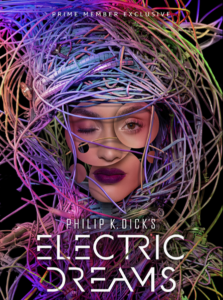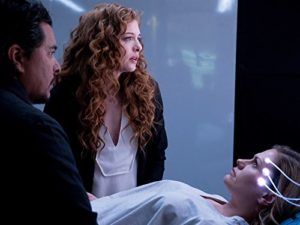
Philip K. Dick’s Electric Dreams – Real Life
 Starring: Anna Paquin, Terrence Howard, Rachelle Lefevre, Lara Pulver, Guy Burnet
Starring: Anna Paquin, Terrence Howard, Rachelle Lefevre, Lara Pulver, Guy Burnet
Director: Jeffrey Reiner
Writer: Ronald D. Moore
Reviewed by Sidney Morgan
This review CONTAINS MINOR SPOILERS.
Sarah (Anna Paquin, True Blood, X-Men) is not well. While many of her colleagues died in a shooting, the guilt from having survived has taken a toll on her life. Following a suggestion, she takes a virtual vacation, but not just some ‘put on your VR goggles and look around vacation.’ Instead, it’s an induced dream state in which the dreamer is fully immersed in the dream, believing it to be reality. Placing the device against her temple, Sarah drifts off, at which point we meet George (Terrence Howard, Empire, Wayward Pines). After spending a bit of time with him, we find out that George has experienced a traumatic as well. And in order to deal with the heartache of losing his wife, he uses similar dream inducing technology. When he places the device on his head, he drifts off, and suddenly we see Sarah open her eyes.

When we’re dreaming, how do we know that we’re dreaming? Look around and ask yourself if you’re awake or dreaming. Is reading this review real? How do you know? This question of what defines reality often shows up in Philip K. Dick’s work, including in this episode, Real Life. When Sarah goes on ‘vacation,’ she begins to wonder whether her actual life isn’t the dream.
Similarly, George wonders the same thing. Both places feel real. They can touch things, interact with others, experience events, and eat. Both worlds share common parts, like the diner, Katie (Rachelle Lefevre), and even the villain Colin (Guy Burnet). Nothing stands out to betray one place or the other as being a dream, except that Sarah’s world is set in the future. But simply continuing to visit both ‘worlds’ isn’t an option as both Sarah and George are putting their lives in danger each time they use the devices.

The analysis and reasons given by the characters to correctly distinguish dream and reality are interesting and telling how powerful our subconscious can be. When Sarah first asked what her vacation would be like, Katie explains that it varies from individual to individual because it’s a manifestation of the desires in their subconscious. Fast forward to the end of the episode and Sarah is convinced that George’s world must be real and hers the dream. She argues that no life can be as perfect as hers. After all, she is a top-notch cop in a Blade Runner-like futuristic world and has the perfect spouse.
Meanwhile, George believes Sarah’s must be real because it’s the one where his wife is still alive. Even though in his reality he’s a billionaire with a Bruce Wayne-like habit of vigilantism, it’s filled with too much sorrow. And the director doesn’t provide the viewer with any clues to help make the determination either. It’s confusing. It’s fantastic storytelling.

Real Life also looks at how our perception of reality can be affected by our mood and our feelings. Both Sarah and George are burdened by enormous amounts of guilt, affecting their mental state. Both feel responsible for miseries inflicted on others, which stops them from being truly happy. Even if presented with positive situations, perfect situations, happy situations, they have difficulty accepting it.
The episode even goes so far as to suggest that our main characters seek to be punished for their sins or what they perceive as sins, engaging in self-destructing behaviours. They see misery as something that is deserved. But is that a true statement of human nature? Does excessive guilt lead to self-destructive behaviours? Are we even aware of it when it does? And does it truly affect what we perceive is a deserved reality? It’s an unsettling idea to think we wouldn’t be able to tell dream from reality because of the effects of guilt.
Anna Paquin and Terrence Howard perform well. However, the plot and limited runtime made it difficult for both to truly immerse themselves in their alternate realities and seriously discuss the ramifications of their perception. With fewer characters to interact with, the questioning of their reality was shown through their facial acting, resulting in a few silent moments. Nonetheless, their questioning affects our perception and makes us question as well. It’s another strong entry in this anthology.
Last thoughts
 Twilight Zone certainly set the bar high for subsequent sci-fi anthologies. Comparisons are inevitable, and none are found to be a match for its quality. But, that does not mean all sci-fi anthologies are bad. In fact, there have been quite a few solid ones, like Amazing Stories, The Outer Limits, Black Mirror, The Ray Bradbury Theater, and now Philip K. Dick’s Electric Dreams. The episodes weren’t perfect. There was quality variance from one to the other. But most of the issues were a result of the writing.
Twilight Zone certainly set the bar high for subsequent sci-fi anthologies. Comparisons are inevitable, and none are found to be a match for its quality. But, that does not mean all sci-fi anthologies are bad. In fact, there have been quite a few solid ones, like Amazing Stories, The Outer Limits, Black Mirror, The Ray Bradbury Theater, and now Philip K. Dick’s Electric Dreams. The episodes weren’t perfect. There was quality variance from one to the other. But most of the issues were a result of the writing.
Every episode was an adaptation of the source material. However, the degree to which each episode’s writer(s) chose to remain true to the original or morphed it, varied. A logical outcome given the context during which the originals were written, and a lot has changed in sixty years. Consequently, some writers chose to adapt the spirit, the theme and most of the plot, while others chose very little, down to keeping only the names of the characters. And though I understand the creative freedom that comes with such adaptations, it is being sold as Philip K. Dick’s stories. Heck, it’s in the title! More consistency in the writing would have made this a better overall anthology.
The anthology included a bit of everything. Some stories took place in space, some on earth. Some took place in the far future, some in the near. Others had aliens, and some had androids. Some ended on a note of optimism, some less so, and some left the interpretation ambiguous enough for the viewer to come to their own conclusion. Some had straightforward, simple stories, while others were more complex. But all the stories were good and entertaining. Amazon made sure they backed this production with proper financing to get the actors and provide the production value we’d expect from sci-fi shows. The settings, the locations, and the special effects were excellent.
Personally, I enjoyed the thought-provoking issues that were brought up. One could certainly watch these episodes purely for their entertainment value, and they wouldn’t be disappointed for all the reasons I’ve already mentioned. However, delving deeper into the meanings and ideas leads to great questioning. What is real? How are we able to distinguish realities, or reality from dream? And what defines humans? What does it mean when one claims to be human? And of course, in typical Philip K. Dick fashion, one can argue both sides as there is no answer. At least he doesn’t provide one.
At the time of this review, Amazon has not announced whether there will be a second season. I am rooting for one. There is enough material left to choose from as Philip K. Dick wrote just over 120 short stories, and the ten already aired are great sci-fi television.
Episode (Real Life) verdict: A strong watch.
Series Verdict: An absolute must watch!



